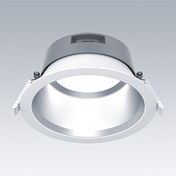Chalice 3 / CHAL3 200 3000-830 EHF E3D RSB
93901310
▼ Data Sheet
A high efficient and sustainable LED downlight with low height. Suitable for mounting in ceiling thicknesses of 1 to 40 mm and Ø200mm cut-out with spring clips. Remote, pluggable, Fixed output LED driver NFC configurable with 3-hour emergency light function and self-test / DALI addressable testing. Body: die-cast aluminium for high efficient thermal management with recycling content >90%. Diffuser: polycarbonate. Reflector and trim: polycarbonate smooth reflector in satinbrite finish with wide beam. Class II electrical, IP54_IP20. Complete with 3000K LED
Installation in concrete ceilings not permitted.
Dimensions: Ø223 x 96 mm
Luminaire input power: 25.2 W
Luminaire luminous flux: 2960 lm
Luminaire efficacy: 117 lm/W
Weight: 1.39 kg
- LED
- CE
- NoIsol
- GLedReP
- 850°
- Halogenfree
- IK09
- IP54-IIP20
- LLedReP
- RG1
- SC2 - Protection Class 2
- Ta=25

